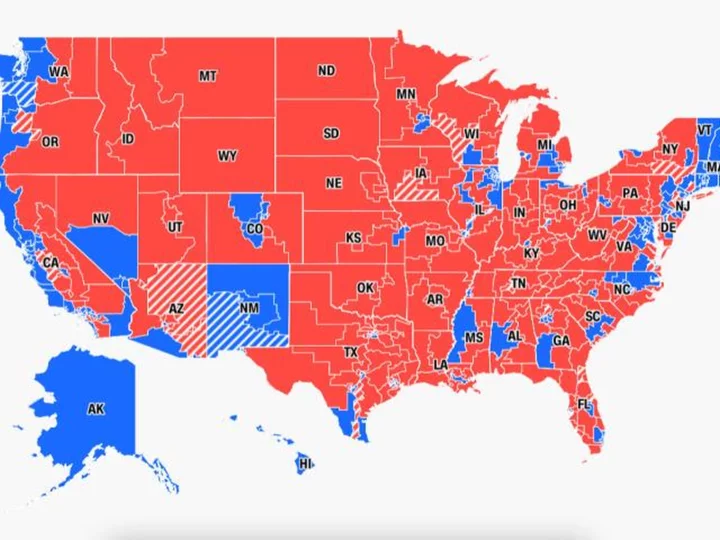Americans' reckoning with their own democracy extends beyond the looming presidential election to a much more local level.
There are new details about how the conservative-dominated US Supreme Court issued its most unexpected decision of the past year and threw out Alabama's congressional map, part of a secret negotiation between Chief Justice John Roberts and Justice Brett Kavanaugh. Read that incredible behind-the-scenes reporting from CNN's Joan Biskupic.
Meanwhile, in Wisconsin, the inverse is occurring -- lawmakers who enjoy a majority thanks to gerrymandered state-level districts are keen on throwing out a liberal state Supreme Court justice even though she took the bench last month after being elected to a 10-year term.
State and federal courts are hearing challenges to maps across the country, which could have a major impact on the coming election and help determine who controls Congress.
Also this week:
A federal court has also thrown into question the congressional map drawn by Republicans that helped them gain seats in Florida. There's a trial over congressional maps underway in Georgia.
Manipulating maps
The selective drawing of legislative district maps during periods of redistricting after the US census every 10 years -- colloquially known as gerrymandering -- is a practice that has been the subject of political and court fights for most of the country's history. The Supreme Court has said partisan gerrymandering done for political reasons is not its concern, but this year it reaffirmed that racial gerrymandering that keeps minorities shut out of the power structure is not allowed.
An endless series of adjustments has sought to address the issue of gerrymandering. These have ranged from major legislation like the Voting Rights Act in the 1960s to the adoption of nonpartisan or independent redistricting commissions in recent decades. The Congressional Research Service has a list of which states, many on the West Coast, have tried to de-politicize the process.
Trying again in Alabama after surprise Supreme Court loss
But lawmakers in multiple states continue to work hard to protect their party control, a battle that is being fought on multiple fronts.
Republicans in Alabama, for instance, unhappy with the Supreme Court's decision this summer, essentially ignored the court by drawing a map that did not include an additional majority-Black district as the justices demanded. A federal court sent the state back to the drawing board again this week with the rebuke that it was "disturbed" by Alabama's actions.
Alabama argued that creating a second majority-Black district would be a sort of "affirmative action."
But the three-judge panel that threw out the map rejected that idea.
"The Voting Rights Act does not provide a leg up for Black voters -- it merely prevents them from being kept down with regard to what is arguably the most 'fundamental political right,' in that it is 'preservative of all rights' -- the right to vote." Read more from CNN's Fredreka Schouten and Ethan Cohen.
Alabama plans to appeal to the US Supreme Court again with an eye to changing Kavanaugh's mind.
Gerrymandered lawmakers target anti-gerrymander judge
In Wisconsin, a Marquette University Law School review of data tells the story of how partisan gerrymandering -- the kind the Supreme Court doesn't concern itself with -- makes it virtually impossible for Democrats to win the state's assembly. When Gov. Tony Evers narrowly won statewide in 2018, he got 49.6%, or about half of the vote. But because of how the state's legislative maps were drawn, the Republican then-Gov. Scott Walker got a majority in 63 of the state's 99 assembly districts, just two fewer than in 2014, when Walker won a majority of votes in 2014.
It is lawmakers elected from Republican-friendly maps who now want to remove the liberal state Supreme Court justice, Janet Protasiewicz, from office in part for her opposition to the maps. Read more from CNN's Eric Bradner.
North Carolina's new Supreme Court overturns gerrymandering ruling
North Carolina Republicans tried to cut the state courts out of the federal redistricting and elections process altogether by pushing a fringe legal theory known as the "independent state legislature theory." The US Supreme Court rejected that argument, which could have upended how federal elections are contested in a consequential decision earlier this year.
But North Carolina Republicans seem likely to ultimately get the map they want. Republicans gained a majority on the state's Supreme Court this year, and the court has ruled it has no authority to oversee partisan gerrymandering.
New map in Louisiana
There are many more legal fights over congressional maps underway. The US Supreme Court in June also allowed for the Louisiana congressional map to be redrawn to allow for another majority-Black district.
From CNN's report on the Louisiana decision by Tierney Sneed: "Louisiana state officials were sued last year for a congressional map -- passed by the Republican legislature over Democratic Gov. John Bel Edwards' veto -- that made only one of its six districts majority Black, despite the 2020 census showing that the state's population is 33% Black."
Congressional maps are in question in many states, including Georgia, where there is a trial underway in Atlanta.
Kentucky's Supreme Court is set to hear arguments later this month about whether gerrymandered maps violate the state's constitution.
On the flip side, Democrats are trying to get more friendly maps in New York, where a court-drawn map led them to lose congressional seats in 2022.
Supreme Court allowed maps it now rejects to be used in 2022
One way to view these court decisions is that the US Supreme Court allowing or insisting that maps in Alabama or Louisiana be redrawn could have a real impact on who controls Congress after the 2024 election. Republicans hold a tiny five-seat majority.
Another way to view these court decisions is that when the US Supreme Court allowed the GOP-drawn maps to be used in these states in the 2022 election, it helped Republicans gain that slim majority.

